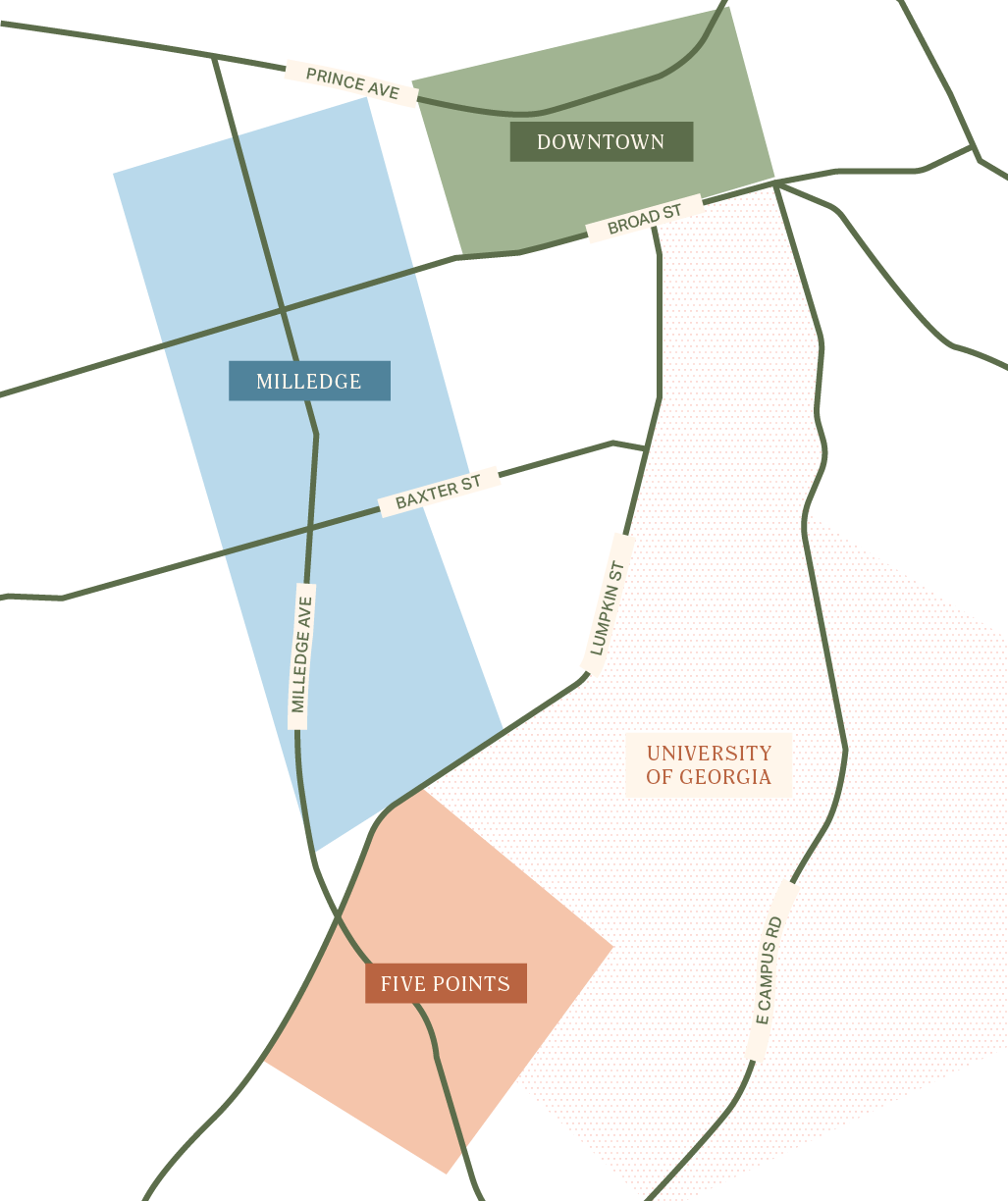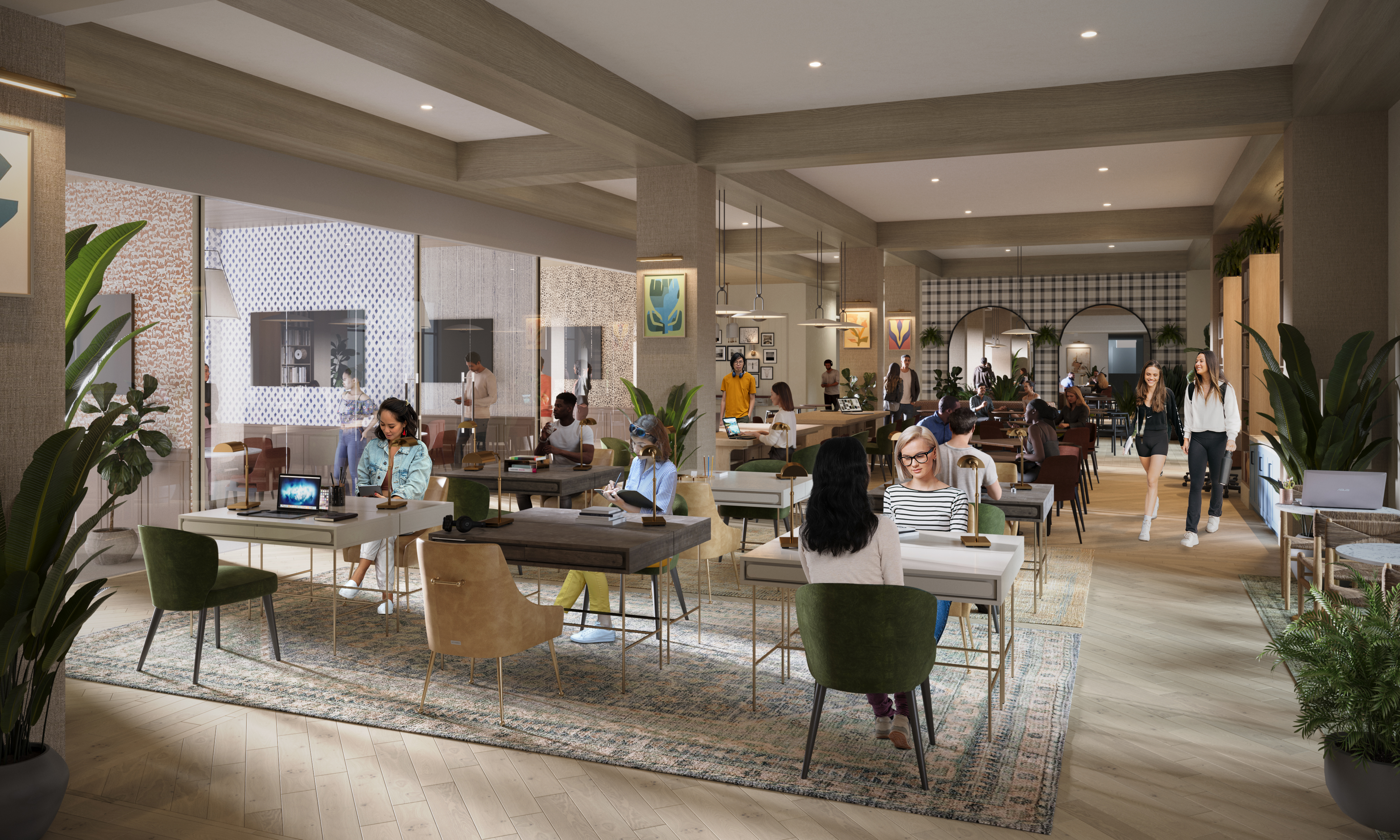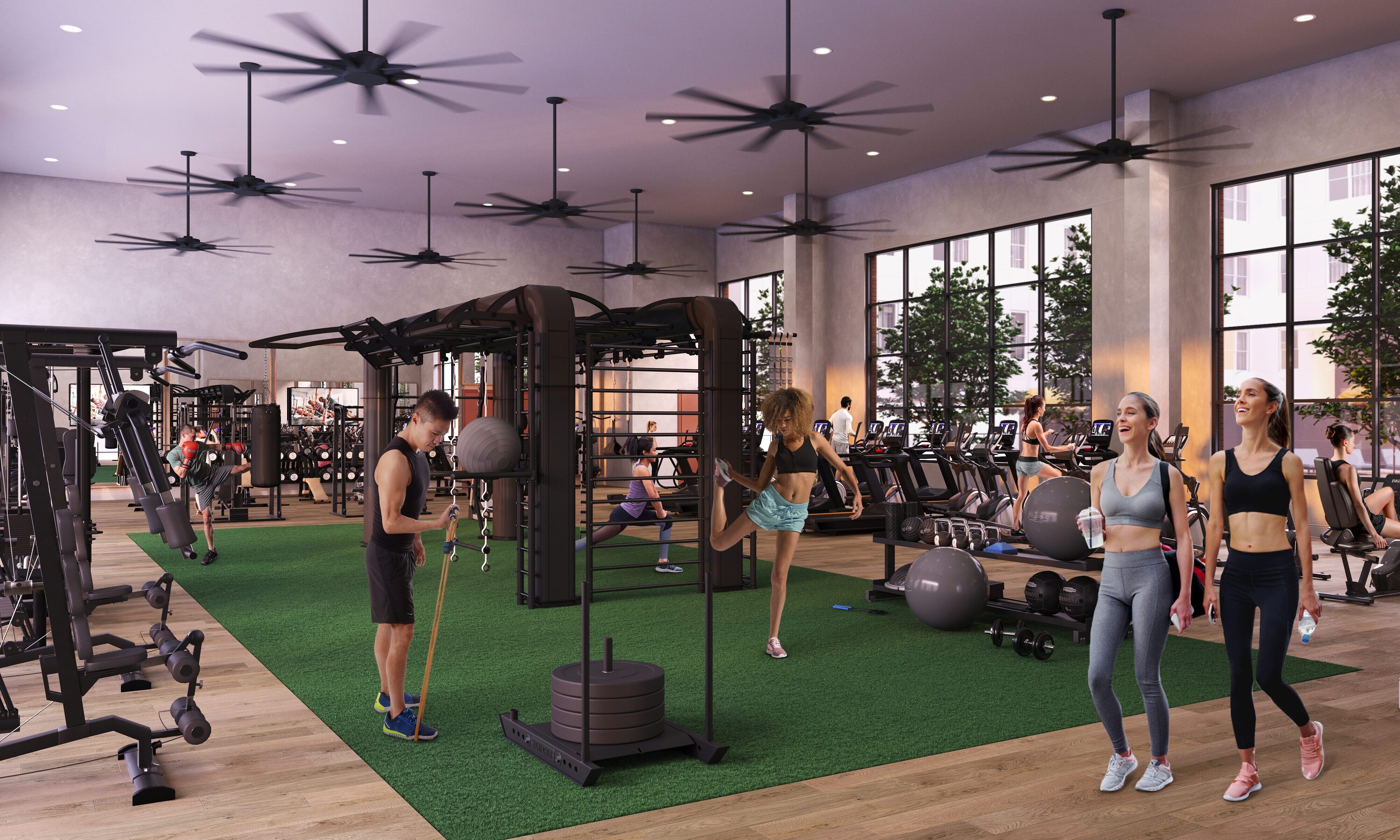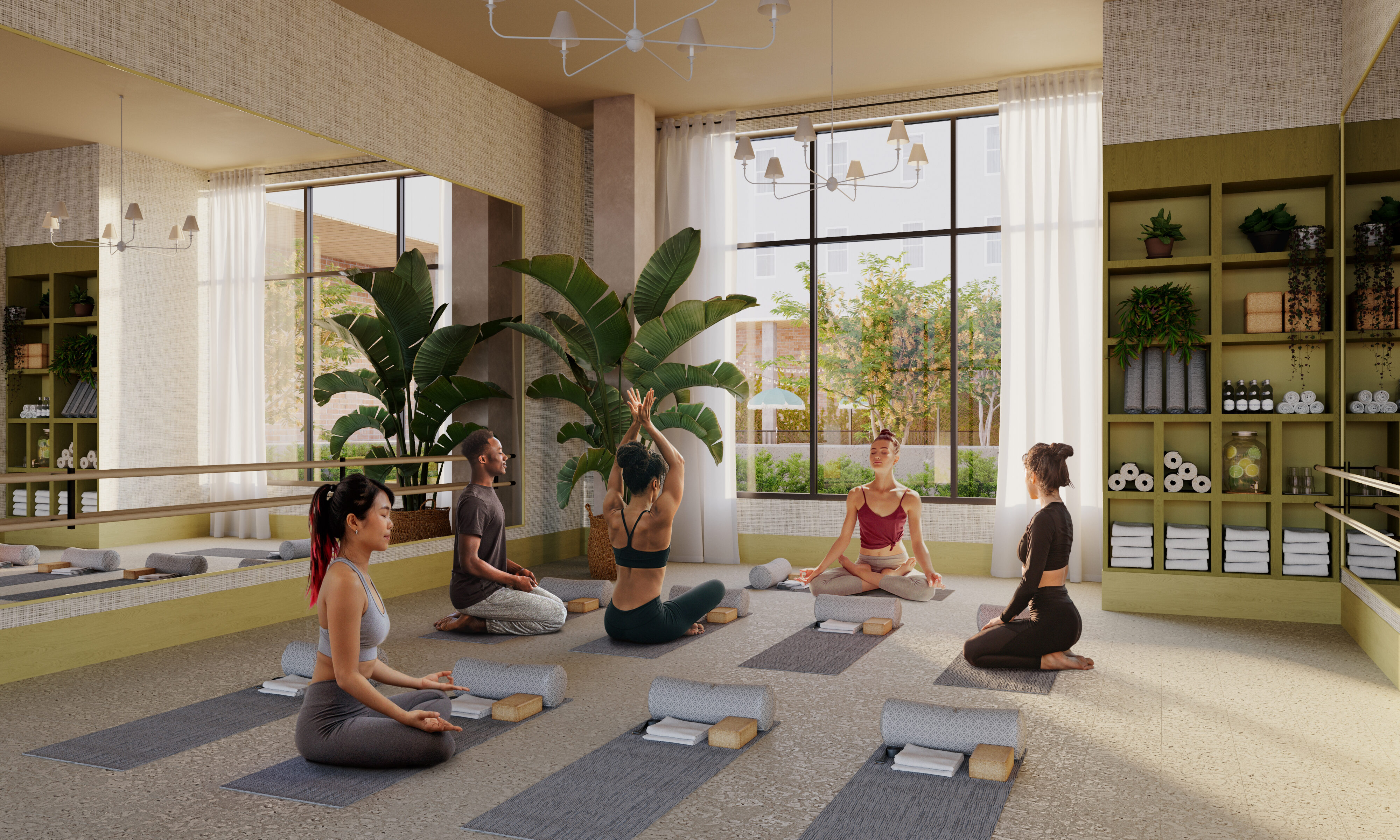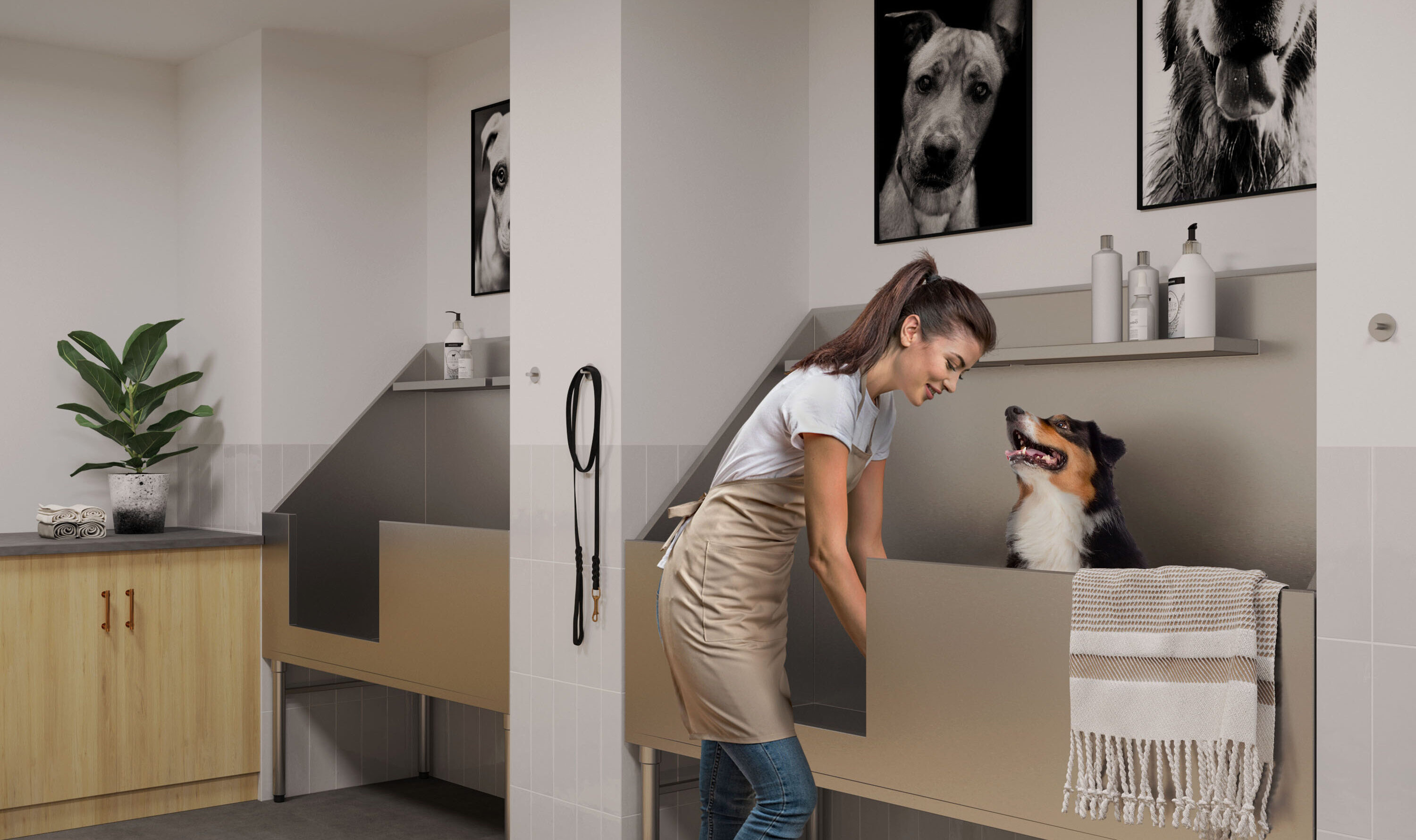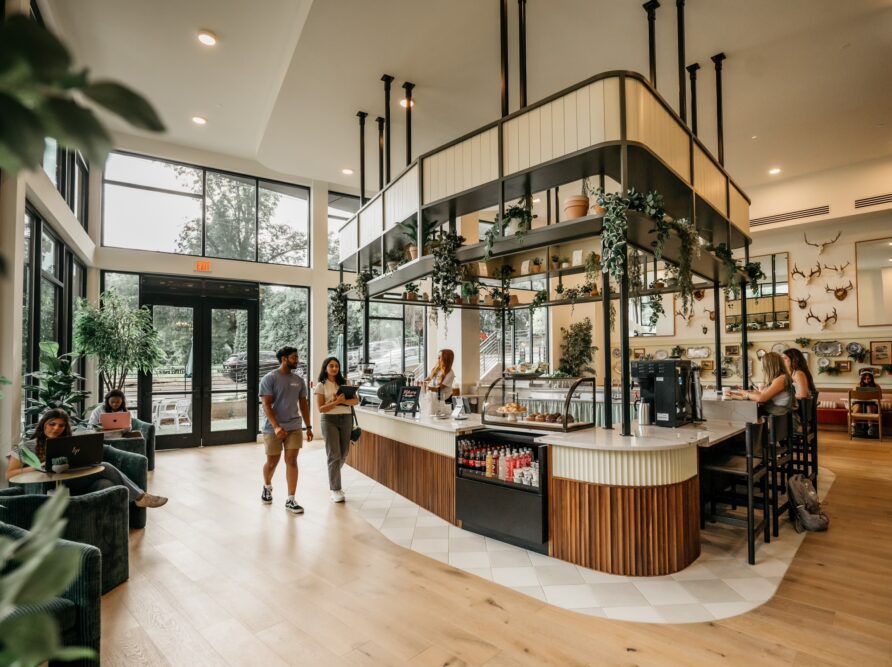We get it, finding the perfect place to live as a student can be stressful…
But don’t worry, we’re here to simplify the process for you.
If you’re deciding where to live as a student at the University of Georgia, you may be asking questions such as:
- Where do UGA students live?
- How much does it cost to live in Athens?
- How do I find off-campus housing near UGA?
And the list goes on. But relax. In this guide, we will address common questions related to where to live in Athens, finding housing, the application process, and all things student living.

At Rambler, our team has helped hundreds of students sign leases, so we know how important it is to make a well-informed decision. Our goal is to help you feel confident and knowledgeable throughout your housing search to ensure you find a spot that fits all your needs.
From choosing your ideal location to nailing down the details of touring and signing a lease, we’re here to help so you can have peace of mind you’ve made the best decision for you. Let’s find your dream place in Athens!

Contents
Chapter 1: Living in Athens
Chapter 2: Cost of Living in Athens
Chapter 3: Finding a Student Apartment in Athens
Chapter 4: Touring
Chapter 5: Applying
Chapter 6: Signing Your Lease
Chapter 7: Moving
Chapter 8: Living at Rambler
Chapter 1: Living in Athens

Where do UGA students live?
Freshmen: All first-year students are required by the University of Georgia to live on campus in a residence hall.
Read Next: A Freshman’s Guide to Student Housing at UGA
Sophomores to Seniors: The majority of UGA students do not live on campus following their freshman year, so there are ample options when it comes to off-campus housing. Most students want to be walking distance from campus to avoid finding parking or taking the bus.
Graduate Students: Many graduate students choose to live on or near UGA campus. As more time is typically spent on campus than during undergrad, proximity to campus and quiet places to work and study is usually the most important factor when finding housing. Graduate students often live in studio or one-bedroom apartments either provided by University Housing or off campus.
Read more: What Types of Housing Are Available for UGA Students?
Renter’s Tip: Students living close to campus usually live in one of three areas: Downtown, Milledge, or Five Points.
Downtown
Off-campus living options downtown primarily include student apartments, but some students also live in traditional and Greek houses in this area. Apartments downtown are some of the more expensive housing options for students because of the luxury amenities they typically offer.
Milledge
Walking around Milledge Avenue, you will find 19 sorority houses, housing around 50 women each. Milledge is also home to a large number of fraternity houses, making this area a social hub for students involved in Greek Life. Additionally, there are a few apartment buildings around Milledge. Apartments in this area are a great option for underclassmen involved in Greek Life who chose not to live in their house but still want to be close by and stay involved with their chapter.
Five Points
Traditional houses are the most popular option for students living in Five Points, but there are many apartment options as well. Both traditional houses and apartments in Five Points are less expensive than those on Milledge, largely due to the fact that Five Points is farther from downtown and campus. This area of Athens is popular for students who enjoy a quick walk to campus but want to be a little removed from the action in a quieter side of town.
Other neighborhoods in Athens include North Athens, Chicopee-Dudley, East Side, Baxter Street, Macon Highway Area, and Epps Bridge.
Read more: Where to Live near UGA if You Don’t Want to Live on Campus
What’s it like to live in downtown Athens as a student at UGA?
Downtown Athens is the heart of the city, making it a hotspot for UGA student living. This vibrant scene blends the energy of the campus with the allure of the city. Not only is getting to campus a breeze, the lively downtown atmosphere offers endless opportunities to explore the music scene, dine and socialize.
Along the streets of downtown Athens you can find:
- Iconic entertainment venues like Georgia Theatre, 40 Watt, and The Classic Center
- Restaurants such as Chuck’s Fish and South Bar
- Popular social spots like Paloma Park, Boar’s Head and Silver Dollar Bar
- Stores like Onward Reserve, Fabrik and The Red Zone

What are the benefits of living in downtown Athens?
Read Next: The Best of Athens, GA
1. Walkability
The walkability of UGA’s campus and the surrounding areas is easily one of the best parts of being a Bulldog. Walking is the number one way to get to campus and its surrounding areas. Many first- and second-year students even choose not to bring a car because they find it’s possible to get around = Athens just fine without one. Especially if you live in the downtown area near North Campus, restaurants, bars, boutiques and convenience stores are easily accessible by foot.
2. Free Transportation
Luckily, UGA makes transportation around Athens affordable and accessible. One of the best parts of being a student at UGA is the ability to utilize the bus system. Different bus routes in the area make it easy for you to catch a ride virtually anywhere on or near campus for free with a student ID. There are even a couple routes that run until 1:00 a.m. or 3:00 a.m. all week, stopping downtown at The Arch and then making their way through campus.
3. Campus Involvement
The closer you are to campus, the more likely you are to spend time there. Living in a community with other students surrounds you with college culture. Not only is it easier to make friends, but it’s easier to stay connected when you’re in such close proximity.
Read more: Which Student Housing Apartments are Closest to The University of Georgia?
4. Fit Your Lifestyle
Most of the apartments in downtown Athens are specifically designed for students. The setup of student apartments will boost your sense of community by being surrounded by other students. It also includes a few logistical perks such as:
- Individual (by-the-bed) leases, so you don’t have to worry about the financial liability of splitting rent with other roommates.
- Your lease will be in-line with the academic term of a university student, usually starting in early August.
- Student housing complexes typically have high-tech study spaces and fitness centers that add convenience to your daily schedule.
Read more: 5 Benefits of Signing an Individual Lease in Athens
5. Access to the Rest of Athens
When you live in downtown, you have access to all that both downtown and UGA campus have to offer. You will be within walking distance of dozens of coffee shops, restaurants and boutiques. Athens is known for its nightlife, so living in downtown means you’re just a short walk away from all the bars and hot spots.
Read the full article: 5 Benefits of Living in Athens Student Apartments
Do I need a car to live in Athens?
Whether or not you choose to bring your car is up to where you choose to live in Athens and your personal preference of how you like to get around.
Many students who choose to live downtown or near the university do not find a car necessary. However, if you choose to live anywhere else in Athens, a car is the primary way to get around.
Walking or biking to campus is also very common for students. However, keep in mind that bike lanes are not available on every street and Athens can be very hilly, making other places around town more difficult to walk or bike to. Athens Transit now runs 23 buses on 18 routes covering the city. The University of Georgia also runs 32 buses in and around campus. You can ride both bus systems for free with your student ID. Most off-campus apartments have easy access to either bus system or offer their own shuttle services. However, getting to places such as the store or work using the bus, might not be as easy or convenient as getting to campus.
UGA has partnered with Lyft to create the Ride Smart Program. This enables students to get 50% off on Lyft standard or XL rides seven days a week from 10:00 p.m. to 6:00 a.m.
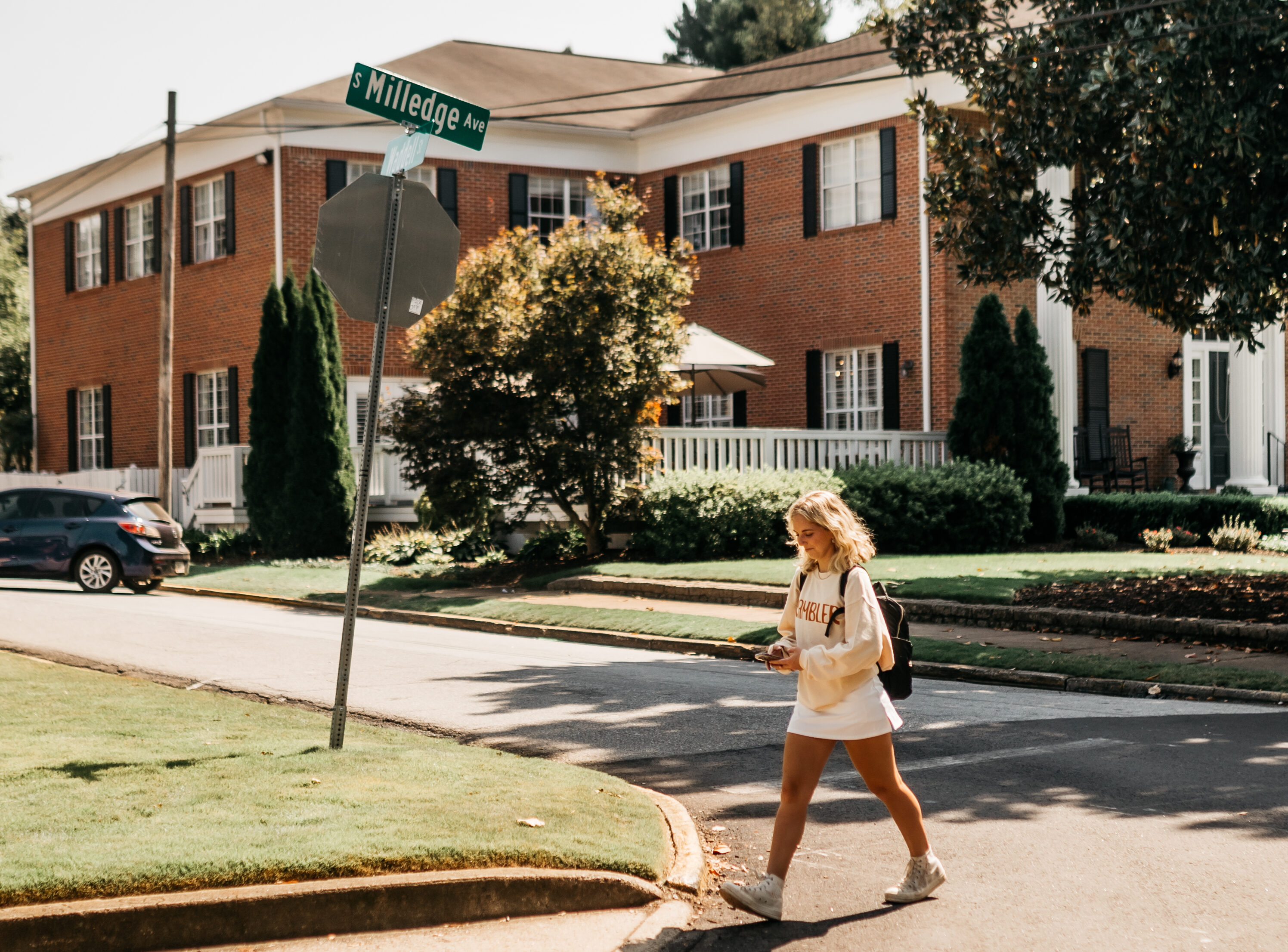
Where can I park if I want to drive to campus?
There are a number of options on campus for parking with options for both hourly and monthly rates.
If you’re living on campus or need to be on campus frequently, you might consider purchasing a UGA parking permit. Students can apply for a parking permit in a specific on-campus garage or lot for the upcoming academic year. Applications usually open in April at tps.uga.edu/parking.
More questions about parking? Read the Ultimate Guide to Parking near UGA.
How much does it cost to park on or around campus?
Campus Parking Decks:
- 0-30 Minute: $1
- 31-60 Minutes: $3
- 61-120 Minutes: $5
- Maximum Daily Fee: $10
Campus Parking Permits: $150-$480 per year ($10-$40 per month) depending on the parking zone
Downtown Street Parking: $1.75 per hour
Downtown Parking Deck: $1.00 per hour (for most decks)
Prices accurate as of October 12, 2023.
How big is Greek Life at UGA?
As of October 2023, about 29% of UGA undergraduate students are fraternity and sorority members according to the University of Georgia.
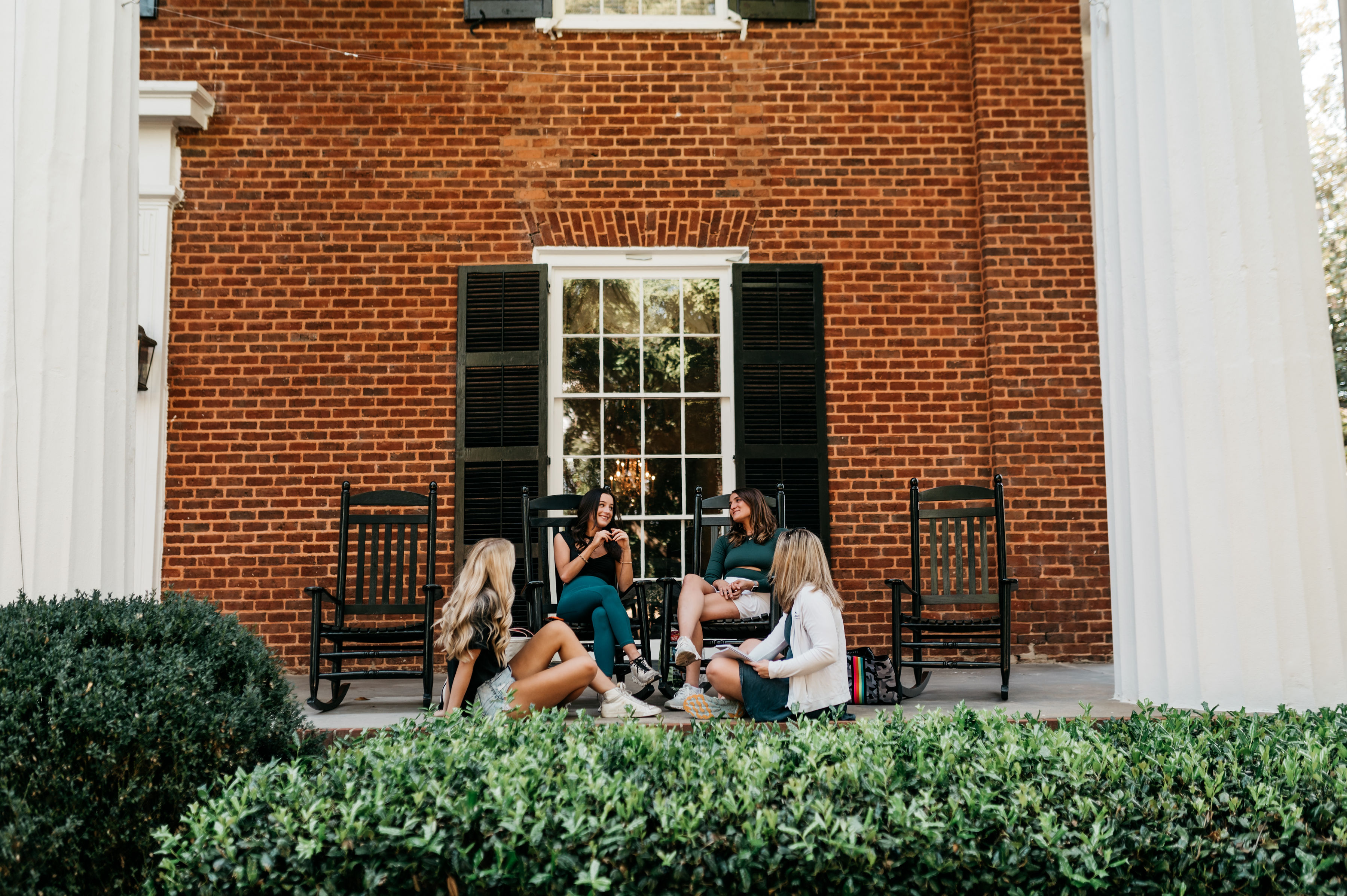
What are my options for housing if I choose to go Greek?
Sorority and fraternity houses are located around UGA’s campus, mostly on Milledge Avenue and Greek Circle. These houses are close to campus and are on the UGA bus routes, so going to class is an easy walk or ride.
Greek houses are typically for second-year members and usually house around 50 people. Many members who are heavily involved with their organization choose to live in the house. Each house has their own way of deciding which members are able to live there, but most are heavily based on GPA.
Read more: Where Do UGA Students Live: Alternatives to Greek Housing
Renter’s Tip: New student apartments sometimes offer block housing, giving you and your friends the opportunity to all live in a block of rooms on a floor with other people in your sorority/fraternity. If you sign your lease early, you’re more likely to be able to take advantage of this option.
Read Next: Everything You Need to Know About Rambler Block Housing
Chapter 2: Cost of Living in Athens

How much does it cost to live in a student apartment?
Student housing apartments in Athens range from around $1,000 to $2,000 per bed, per month.
Student housing apartments are typically more expensive than traditional apartments. This is because these apartments come furnished, are newer, located downtown and close to campus, and offer elevated amenities such as upscale gyms, pet spas, and both shared and private study spaces.
Read more: Benefits of Student Apartments vs. Traditional Apartments in Athens
You’ll have the option to live alone or with up to five roommates. Your lease will run 12 months and align with the academic year, so students can move in in August and move out in July.
Studying abroad for a semester? Read our article on the 7 Tips for Subletting (or Reletting) Your Apartment Near UGA
Read the full article here: How Much Does it Cost to Live near the University of Georgia?
What’s typically included in my base rent at a student apartment?
Furniture
Most student housing apartments in downtown Athens offer fully furnished units. Students don’t have to worry about purchasing large furniture pieces such as a bed, dresser, or desk – they will already be in the apartment upon arrival.
Fully furnished units not only allow you to avoid moving furniture long distances, but they also help you cut costs. You will not have to buy new furniture, appliances or purchase a storage unit in between leases.
A fully furnished downtown apartment typically includes:
- Bed
- Dresser and/or shelves
- Desk
- Couch
- Chairs/bar stools
- TV
- Washer and dryer
Access to Amenities
Almost all student apartments will have community amenties that you will have access to as a resident. At minimum, apartments typically offer a pool, gym and study areas. However, most student housing complexes downtown include luxury amenities that go above and beyond. These may include jumbotrons in the pool area, grilling areas, spas, yoga studios, coffee shops, golf simulators and more. Amenities are one of the best ways for new student apartments to differentiate themselves from their competition, so be sure to check out your options.
Basic Utilities
Student housing apartments typically offer highspeed internet, cable, a washer and dryer, gas and sewage as a part of your monthly rental rate. Some apartments include garbage, while others will add on a small monthly fee for garbage services. This fee usually runs between $5 and $25 per month. Finally, almost all apartments will charge you an additional monthly fee for water and electricity.
Year-Round Housing
If you choose to live in a student apartment downtown, you will likely sign a 12-month lease as opposed to the nine-month lease offered for on-campus housing.
With a year-long lease, you have a guaranteed place to live if you plan on staying in Athens during the summer or winter breaks. If you plan to study abroad, move for an internship, or live at home during the summer months,12-month leases are a convenient option.
Usually, student apartment leases will begin in early August and end in late July, but the exact dates depend on the complex.
Security
Almost all downtown student housing apartments offer various forms of security to ensure resident safety. This may include video monitoring, controlled access to units and amenities, deadbolts, on-site security guards, and more. Security measures will differ by apartment, so be sure to ask what is included while touring properties.
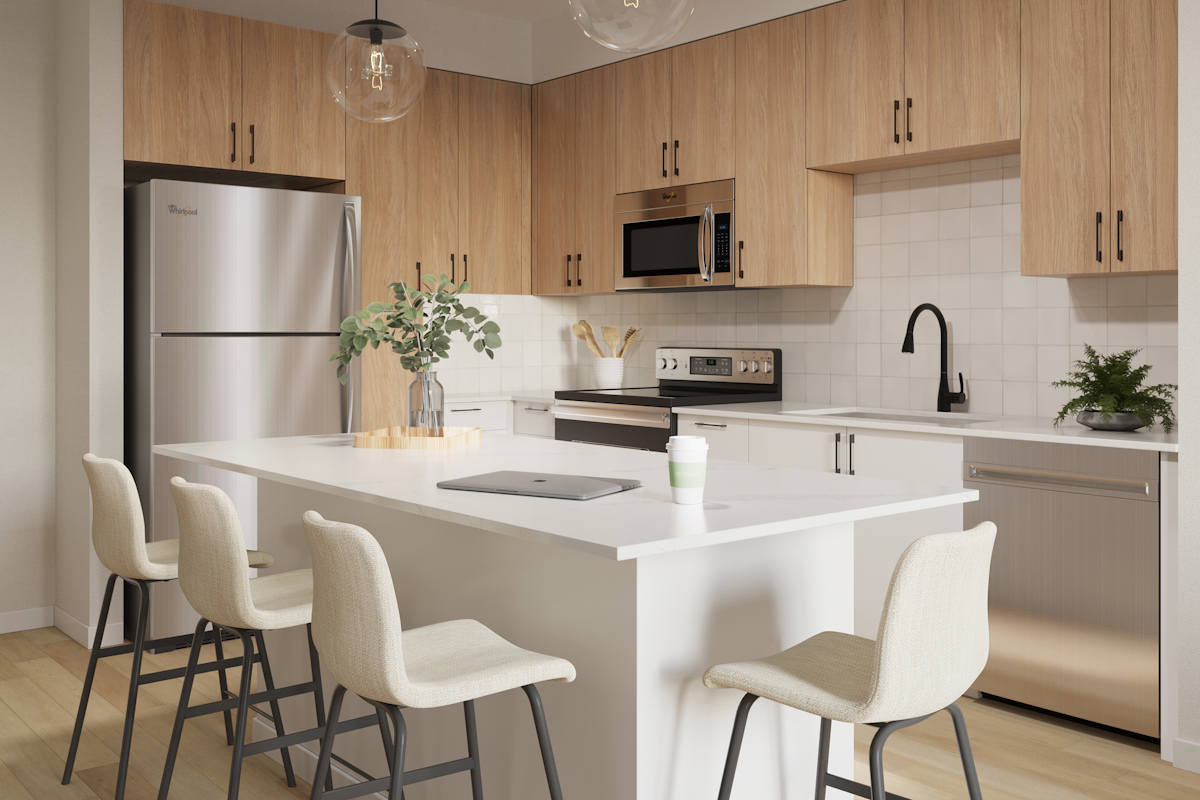
Representative rendering of kitchens at Rambler Athens, featuring stainless steel appliances and white quartz countertops.
If I choose not to live in a student apartment, what are my other options and how much do they cost?
If you choose not to live in a student apartment, you have five other options: university housing, traditional apartments, traditional houses, Greek housing, and student apartments.
Read more: Which is Right for Me? Student Housing vs. Traditional Apartments in Athens, GA
We’ve put together a side-by-side comparison of all of your options:
| University Housing | Traditional Apartment | Traditional House | Greek Housing | Student Apartment | |
| Lease length | 9-month lease following the academic year | 1-year lease; can sometimes offer flexible lease time if you’re planning on studying abroad | 1-2 year lease | 9-month lease following the academic year | 1-year lease starting with the academic year |
| Cost | $1,200 to $4,400per semester; about $275 to $975 per month | 675 to $2,200per month | $650 to $950 per month | Average $4,50 per semester; about $975 per month; includes dues | $1,000 to $2,000 per month |
| Number of roommates | Up to 4 | Up to 3; two bedroom most common | Up to 6 | Up to 4 | Up to 6 |
| Furnished | Yes | No | No | Yes | Yes |
| Wi-Fi included in base rent* | Yes | No | No | Yes | Yes |
| Utilities included in base rent* | Yes | No | No | Yes | No |
| Private bathrooms* | No (unless living in apartment-style dorm) | Yes | No | No | Usually |
| Amenities* | Study lounges, gym, shared laundry rooms, community kitchens, meal plan | Coworking lounges, gym, in-unit laundry, pool, on-site parking, personal bathroom | In-unit laundry, private covered parking | Study lounges, communal areas, meal plans, shared laundry room | Study lounges and private study rooms, gym, sauna, dog wash, pool, on-site covered parking garage |
Read more: Where Do UGA Students Live? Ultimate Guide to UGA Student Housing Options
What costs should I consider other than my monthly rent?
The major costs to consider outside of your monthly rental rate include:
- Application Fee – $50 to $150
- This fee covers the cost of your background check as well as the administrative cost of processing your application.
- Administrative Fee – $50 to $300
- This is non-refundable and used to cover the price of administration, billing, bill auditing, overhead, and similar expenses.
- Some apartments require this fee at the time of application, while others require it on move-in day.
- Security Deposit – $100 to the equivalent of one month’s rent
- Security deposits are typically due at the time of move-in and refundable at the end of your lease term, as long as there are no damages to the apartment beyond typical wear.
- As long as you keep your apartment in good condition, you should have this fee returned to you within 45 days of moving out.
- Parking – $75 to $250 per month
- This rate varies depending on the location, demand, and type of parking garage.
- By paying for parking at a student apartment that is walking distance to campus, you won’t have to worry about paying for or securing on-campus parking that can be competitive and hard to come by.
- Utilities – Varies by month, depending on usage
- Utilities include electric, gas, trash, water, cable/TV, internet and washer/dryer. + Many utility companies charge a fee to cover the costs of utility setup. This fee is a one-time charge and generally ranges from $25 to $100. + Most student housing apartments include Wi-Fi, cable TV and washer/dryers in your monthly installment. Some do not, so it’s important to ask before you sign a lease.
- Many utility companies charge a fee to cover the costs of utility setup. This fee is a one-time charge and generally ranges from $25 to $100.
- Most student housing apartments include Wi-Fi, cable TV and washer/dryers in your monthly installment Some do not, so it’s important to ask before you sign a lease.
- Rental Insurance – $10 to $35 per month
- Varies depending on coverage and provider
- Learn more: A UGA Student’s Guide to Renter’s Insurance
- Trash – $5 to $30 per month
- Covers the cost of trash removal at the
- Pet Fees and Rent
- Pet deposit: $100 to $350 – One-time, refundable payment
- Pet Fee: $100 to $350 – One-time, non-refundable payment
- Pet Rent: $10 to $35 per month per pet
For a complete list and more information, read 9 Additional Costs to Consider At Apartments in Athens, GA
What’s the difference between base rental rate & total monthly cost?
Base Rent
The base rate for an apartment is the price listed for each floor plan at a given property. The base rate only includes rent – it does not include any upgrades, utilities or additional fees.
For student living, features such as balcony access, higher floor, ensuite bathrooms, and less roommates typically result in a higher base rate.
Learn more: What’s Typically Included in Student Housing Rent in Downtown Athens?
Total Monthly Cost
The total monthly cost is your base rental rate plus all of the additional costs you will be responsible for throughout your lease. Some of these fees are required, and some will depend on your personal lifestyle. For example, you may be required to pay a pet fee if you have pets.
Additional fees might include renter’s insurance, utilities, parking, trash services, Wi-Fi, cable, pet fees, and apartment upgrades.
Renter’s Tip: If you choose student housing, you will sign an individual or “by-the-bed” lease. This means that each roommate within a unit will be given a separate base rental rate, and you will not have to worry about splitting rent yourselves each month and getting it to the landlord on time.
Just because a property has a lower base rent does not mean it will be less expensive over all. Make sure to know all included expenses before signing a lease.
Read more: Base Rental Rate vs. Total Monthly Cost for Athens Student Apartments
Chapter 3: Finding a Student Apartment in Athens

Are you an exchange or transfer student coming to UGA? To help you on your search for housing, we’ve written the ultimate guides to finding housing as an exchange student and as a transfer student.
Should I move to a new apartment or should I renew my current lease?
Pros of moving to a new apartment:
- New amenities
- Updated living space
- New experience but with familiarity of the same roommates
- New community and opportunities
Cons of moving to a new apartment:
- Cost and time required to move
- Likely increase in rent
If your apartment still meets your needs and you value staying in the same place, you may want to consider renewing your lease. If you are tired of living in your apartment and are looking for newer amenities and features, you may want to consider moving to a new property in Athens.
Ask yourself these questions if you’re deciding between moving or renewing your current lease:
- Do I enjoy where I currently live?
- Do I like the location of my current property?
- Is my management reliable?
- Can I afford a nicer place to live?
- Is the time and costs required to move worth the value of the place I’m considering moving to?
- Does this apartment still feel like home or could a new place be a better environment for me to live?
Read the full article here: Moving to a New Property vs. Renewing: Which is Right for Me?
So I’ve decided to live in a student apartment, how should I start my search?
1. Determine your ideal location
Consider the following:
- How long will it take you to get to campus?
- Will you walk, drive or ride the bus?
- Do I like the area?
- Am I conveniently close to other places I go to daily like the grocery store, work, etc.?
2. Decide if you want roommates
Ask yourself:
- Do I have friends I know I would like to live with?
- Will living with other people help make my apartment feel like home?
3. Determine which amenities you value most
To help figure out what is most important to you, make a list of your must-have amenities to help you narrow down your options. We would recommend viewing the websites of properties that you are interested in to get a good feel of what they have to offer.
Common amenities for student apartments include:
- Pool and hot tub
- Fitness center (can sometimes include yoga studios and spin rooms)
- Study lounges and private study rooms
- 24-hour security
- Package lockers
- Units often include washer/dryer, Wi-Fi and cable TV and come fully furnished
4. Set your price range for rent
Location, roommates and amenities heavily influence how much you will pay for rent, utilities and other costs.
Consider these potential additional costs:
- Parking fees
- Pet fees
- Renter’s insurance
Read more: 8 Ways to Save Money on Student Apartments in Athens, GA
5. Make a list of places to tour
Based on your desired location, amenities and budget, search online for some properties that meet these needs. Starting with keywords like “Student apartments in Athens, Georgia” or
“downtown Athens student apartments” will help you find properties specific to UGA students.
Once you have found a short list of properties that are a potential fit for you, visit their online contact page and book a tour. If you would rather speak with someone before touring, you can also call the property’s leasing office for more information.
You can read our apartment reviews to get you started on your list:
- Review of The Mark
- Review of The Mark Phase II
- Review of The Standard at Athens
- Review of The Wright House
- Review of The William
- Review of Georgia Heights
Read the full article here: 8 Steps to Finding a Student Apartment Near UGA Campus
Should I live with roommates?

Living with roommates is a personal choice that can be a great way to live with friends and save a little money. Consider these pros and cons as you make your decision.
Pros:
- Affordability: Depending on the complex you choose, rent and utilities are usually less expensive the more roommates you have.
- Social: Living with roommates gives you a form of “built-in friends.” Some of the most enjoyable times in college are nights spent at home cooking, watching movies or having game nights with your roommates.
- Peace of Mind: In case of household emergencies and accidents, having roommates can provide immediate assistance and support.
Cons:
- Distractions: Not everyone prioritizes downtime and studying in the same way. Living with other people is fun, but if it’s too much fun it could become a distraction.
- Reduced privacy: When you share a space with other people, there will inevitably be a lack of privacy. If you value personal space and view your home as the place where you can be alone, living with roommates may not be for you.
Read Next: 5 Benefits of Living in a One-Bedroom Apartment & Which 1×1 at Rambler is Right for Me?
How do I find roommates for a student apartment?
Make sure to answer these questions for yourself before beginning to search for roommates:
- What is my monthly budget?
- How many roommates would I be willing to have?
Once you’ve thought of your answers to these questions, start looking for other people who have similar answers and want to live in the same location as you. Some ways to search for roommates include:
- Asking around. Whether it’s your friends or members of your organization (sorority, fraternity, club, etc.), it never hurts to ask!You never know who’s still looking.
- Looking at social media.
- UGA has Facebook pages, such as University of Georgia Class of 2027 and UGA Transfer & Current UGA Students Roommate Finder, where students can post a little bit about themselves and read other students’ “about-me” posts.
- On Instagram, you can find pages where you can submit a photo and short bio introducing yourself to new classmates. You can also find accounts specific to your class such as @discoveruga27.
- Roommate matching. Many apartment complexes offer roommate matching services. When you fill out your application to live there, it will likely include questions about your living habits and preferences. Your answers will be used to pair you up with someone else in need of a roommate.
After you’ve found some people you’re considering living with, it’s always a good idea to make sure you’re both the right fit for each other. We suggest using this roommate questionnaire to make sure you ask all of the right questions and start your time as roommates together with open communication!
Renter’s Tip: Start the search for roommates early! You’re more likely to have more options of people to live with, as well as more availability at any property you and your roommates choose to look at.
Read more: How to Find Roommates at The University of Georgia
How far in advance should I start looking for a place?
Students will start to secure housing for the next academic year as early as September. You should sign a lease by March at the latest. New developments may start taking leases up to 18 months
before their delivery date.
Read the full article here: When to Start Looking For Student Apartments as a UGA Student
What are the benefits of signing my lease early?

1. Best rates
Many student housing properties use a tier system during the leasing process. When leasing first opens, rates will usually be at their lowest, also called first tier rates. Then, as units decrease in availability, rates will typically be raised per month, per person.
2. Parking
If you are planning to park at your apartment complex, you should consider signing your lease early to increase your chances of securing a spot as space is often limited and can go quickly as the leasing season progresses.
3. Roommate choice
By signing your lease early, you will have more options when it comes to roommates. As time goes on, more and more people have secured their living situation, so you will have a smaller pool of potential roommates over time.
4. Choice of apartment & room
Most developments have a limited number of units with special features such as balconies and specific views. If having these amenities is important to you, you should consider leasing early to increase your chances of securing one of these units.
5. Peace of mind
By signing your lease early, you gain the feeling of security on your housing decision. It is one more thing that has already been taken care of and you won’t find yourself scrambling at the last minute to find a place to live in subsequent years.
Read the full article here: 5 Benefits of Signing Your Lease Early at The University of Georgia
What are the benefits of moving into a newly constructed apartment?
1. Modern design
A big incentive to live in a new construction are the modern designs and finishes. Many new developments have a sleek design with bigger windows, new technology, and furniture packages that set them apart from an older student apartments. New buildings near UGA are often decked out with upscale designs and trendy features that make you excited to come home after a long day of classes.
2. You are the first
Living in a new development means that you are the first person to use your shower, cook on your stove, and live in your space! The entire building is brand new, making you one of the first people to enter the lobby, use the gym, and take a dip in the pool! You get to be the first person to call the space home, and it creates the perfect fresh start while living in Athens.
3. Updated amenities
Modern, up-to-date amenities are one of the top selling points for a new apartment. Having updated amenities under one roof makes living in a newly built apartment extremely convenient. Your new home could be a one-stop-shop for washing your dog, your daily coffee run, and a spin workout.
Also, it is important to remember that all the costs associated with these updated amenities are factored into your monthly rate. You may think that it costs less to live at an older development with less amenities, but when you factor in all your other daily costs, such as a gym membership, you will find that paying more for a new development and amenities is the most cost effective!
4. Sense of community
Hundreds of new residents moving into a new development can sound hectic, but it makes for a fun move-in experience. This is when you can meet your neighbors who are also moving into your complex.
Everyone is having a similar experience; they’re excited about their new apartment and can’t wait to meet everyone! This creates a tight-knit community as everyone explores their new home.
Many new complexes also offer community events where you can meet new friends, participate in the free activities, and enjoy some free food! These are a great perk that brings the community together.
5. Unexpected perks
In a new development near the University of Georgia, you’ll find many bonuses that most people don’t normally think of during their housing search. For example, many new buildings typically offer added security with controlled access points and 24/7 surveillance cameras throughout the property.
New construction also tends to emphasize customer service. While older buildings already have an established reputation, a brand new community relies heavily on the satisfaction of its residents to maintain its name. This typically leads to a friendly, attentive staff that is happy to assist you.
Read more: 5 Benefits of Living in a New Student Apartment Near UGA
How do I decide which floorplan is right for me?
The first step to answering this question is to determine if you will be living alone or with roommates. Read more about finding a roommate here.
There are different benefits and reasons to live in each floorplan, as well as features specific to the property you are looking at. It’s helpful to ask a leasing staff member about features like balconies, views, bathrooms, and layouts that might be available in a floorplan you’re thinking about.
These features might affect your base rent, but knowing what’s important to you can help you decide what you need to make sure you feel at home in your space. The more you start to look at and tour apartments, the more easily you will be able to determine which space is best for you.
Chapter 4: Touring
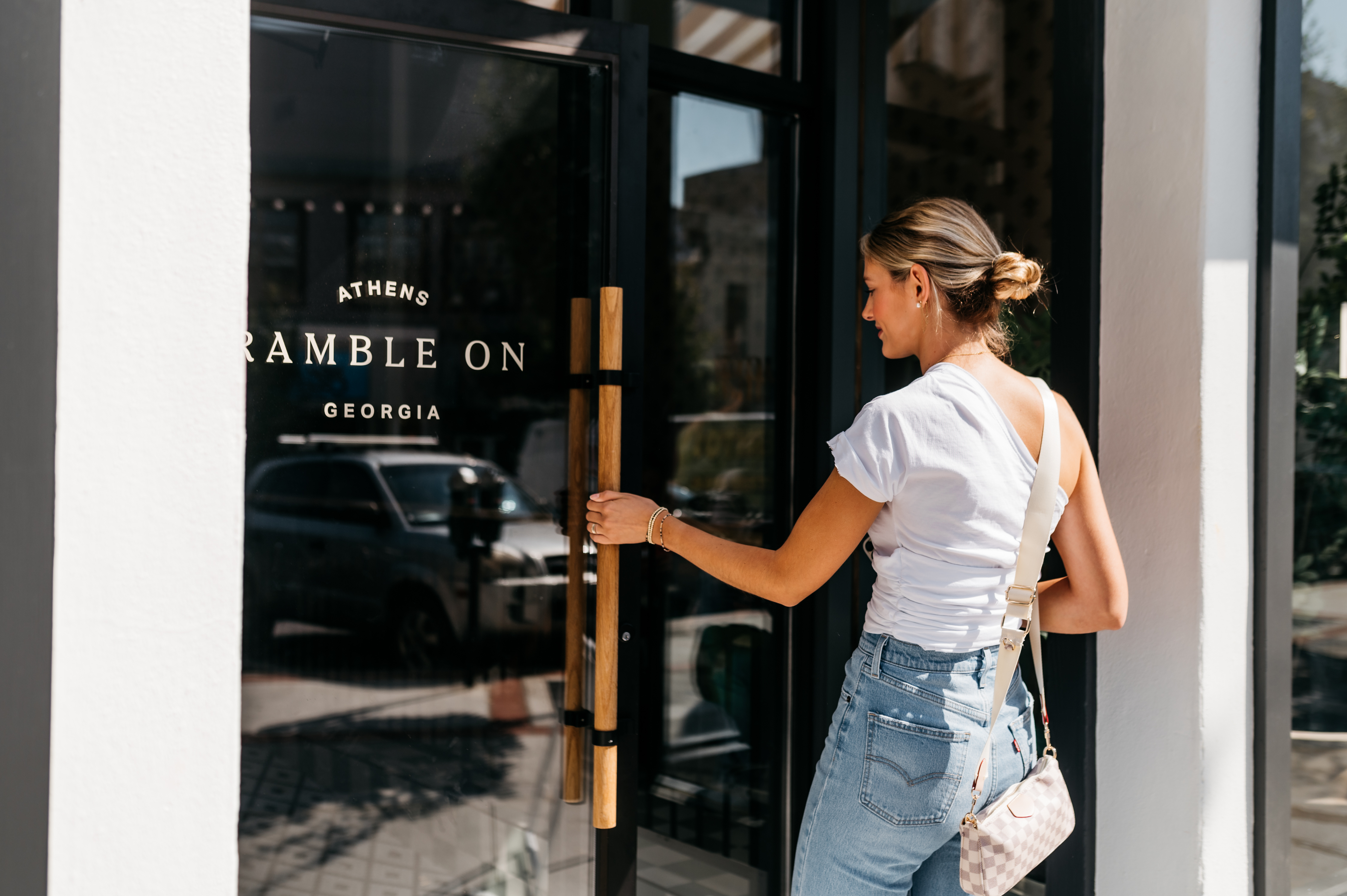
Why should I tour before signing a lease?
If you haven’t lived in downtown Athens before, touring a property can help you get sense of the atmosphere and location. You’ll be able to speak with a leasing specialist and get your specific questions answered. Touring can also help you narrow down if you’re choosing between multiple properties.
What should I bring with me on a tour?
Make sure to bring a photo ID. It’s standard for the leasing office to hold onto it while you’re on your tour for liability purposes. If you decide to sign a lease after your tour, you will also need a driver’s license or government-issued photo ID to complete your application.
If you’re planning on living with roommates, bring them! This is a decision you will be making together, and touring properties together will ensure you’re both on the same page and educated on the property. With everyone present, you are more likely to get all questions answered and be able to make a decision more efficiently.
What will I be shown on a property tour?
Renter’s Tip: Ask to see multiple floorplans to compare your options. This will help you get a better sense of the actual size and layout of each space and can help you decide what’s right for you.
If you’re going to tour a new property that hasn’t been fully developed yet, you should still ask to talk through floorplan options so you can ensure you’re making the best choice for you and your roommates.
1. Community Spaces
The leasing agent should show you around the property and help you orient yourself in the building.
2. Preferred Unit
You will be able to see the space where you could potentially be living. If the unit is still occupied, you should be shown the same floorplan in a different unit or one that is most similar to what you’re looking for.
3. Property Amenities
They should show you the building’s amenities so you can better understand what you’ll have access to if you live there.
4. Digital Tour
If the property is new, you might schedule a tour that will take place at the leasing office. The leasing agent will most likely walk you through the property virtually, showing renderings that model what the actual property will look like. At some leasing offices, some of the furnishing from a unit will be available so you can get a sense of how your unit will be set up and furnished.
Read the full article here: What Happens on a Tour of Rambler? What to Expect and How to Prepare

15 Most Important Questions to Ask on Your Tour
- What are my lease terms?
- What expenses are due upon application, lease signing and move-in?
- What does my monthly rental rate consist of?
- How do I pay my rent?
- What is the pet policy?
- How is subletting handled?
- How is reletting a lease handled?
- Is renter’s insurance required?
- What is the policy on move-out fees?
- Is parking available and how much does it cost?
- Do I need a guarantor or a co-signer?
- What happens if I need to terminate my lease?
- How are repairs and maintenance handled?
- How secure is the property?
- How often does rent usually increase and by how much?
Read the full article on the 15 Questions You Should Ask While Touring a Student Apartment in Athens, plus download our Apartment Tour Checklist to bring with you!
Chapter 5: Applying

How do I apply for an apartment?
Most applications can be completed online. You can also fill out your application at the leasing office after your tour.
Filling out an application is generally a 10-20 minute process. You will need to answer basic information, such as your driver’s license information, emergency contact, pet information, current residence, etc. Make sure you bring your driver’s license or government ID for this step.
An application might also ask you for your guarantor information. A guarantor is someone, typically a parent or guardian, who qualifies you to sign a lease. Most UGA students don’t qualify on their own from their monthly income and credit score, so your guarantor is taking on the liability of the rental rate for you. A guarantor typically needs to make at least three times the price of monthly rent in income each month.
Before starting your application, talk to your guarantor and let them know to expect an email with their portion to complete. This will typically include pay stubs, bank account information, and their Social Security Number so that the leasing office can run a background and credit check.
What is a guarantor responsible for?
By guaranteeing your lease, the guarantor is taking on the liability of rent for the entire duration of the lease, plus any damages. If you do not pay your rent, they will be responsible for payment.
In an individual lease, which what you will sign at a student apartment, both you and your guarantor are only signing for your bed space. This means that your guarantor is not responsible for any of your roommates’ bedrooms. They will sign a separate lease and likely have a guarantor of their own.
Read more: What Is a Guarantor? Do I Need One?
Chapter 6: Signing Your Lease

What’s included in a lease agreement?
A lease agreement will include your rent rate, terms of the lease, and important dates. A lease is a legally binding contract. Make sure to read each page thoroughly to understand the terms of your lease and know what you’re getting into. Pay close attention to dates and fees, and take note of when you will pay rent each month, when your lease term ends, etc.
At a student apartment, you and your guarantor are the only ones responsible for upholding your lease. If you choose to sign roommates, they will sign their own lease that they will be responsible for.
Read more: How to Sign a Lease at a Student Housing Apartment near UGA
What fees will I incur when signing a lease and moving to a new apartment?
Depending on the property, the following fees might be due when you sign your lease or on move-in day.
- Admin fee: Admin fees tend to range between $50 to $300. They are used to cover the price of administration, billing, bill auditing, overhead, and similar expenses. Admin fees are typically nonrefundable, so make sure to confirm with your apartment if you’ll be reimbursed if you decide not to sign a lease.
- Security Deposit: Security deposits usually range from around $100 to the equivalent of one month’s rent. A security deposit is a refundable fee held for the duration of your lease term. Security deposits are typically due at the time of move-in and refundable at the end of your lease term, as long as there are no damages to the apartment beyond typical wear.
Chapter 7: Moving
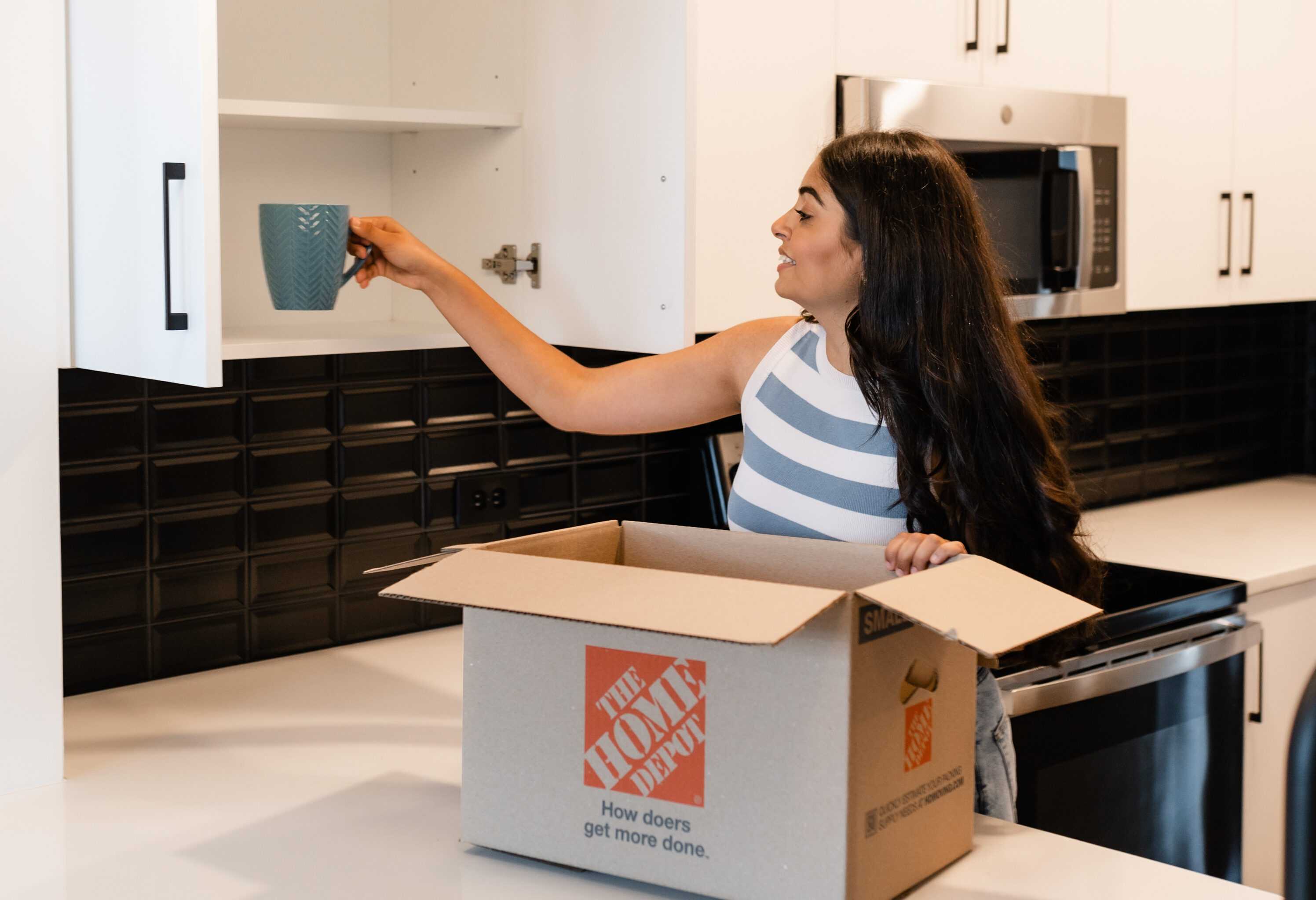
What are some of the costs I can anticipate for moving?
When moving in or out of an apartment, there are often unexpected fees to consider. These may include costs for storage space, cleaning services, and moving services. Depending on your needs, these expenses can range from less than $50 to over $500.
1. Cleaning Service
When moving out of a student apartment, it’s important to leave the space clean to avoid additional charges. Hiring a cleaning service can cost around $100 to over $400, depending on the extent of the cleaning needed. Some residents also opt to hire a cleaning service when moving in, particularly at older properties. Generally, student apartment cleaning services fall on the lower end of this cost range.
2. Storage Space
If you have a gap between leases, you might need a storage unit near UGA to hold your belongings. Off-site self-storage options typically range from $40 to $500 per month based on unit size.
3. Moving Service
Hiring movers can also add to your moving costs, with fees typically ranging from $25 to $50 per hour for each professional and an additional $20 to $50 per hour for the moving vehicle. Some apartment complexes provide movers to assist new residents on move-in day, but you should consider these costs when creating your housing budget.
Need Storage? Check out our guide with the best options for self storage in Athens.
Chapter 8: Living at Rambler

What separates Rambler from other student apartments in Athens?
- Amenities: As a new development, Rambler features breathtaking spaces and amenities that bring joy and let you connect to your community. These amenities include a resort-style pool with a jumbotron, state-of-the-art fitness center with a fully-equipped gym, sauna and yoga studio, on-site dog spa, and a coffee shop on the first floor.
- Floorplans: Rambler offers 19 different floorplans, from studios to five-bedroom apartments, designed with students’ specific needs in mind.
- Location: Located steps from campus and downtown Athens on Broad Street, Rambler is the epicenter of the ultimate UGA living experience.
Read more: 5 Benefits of Living at Rambler for the 2024 – 2025 School Year
What amenities are offered at Rambler?
- Dedicated study mezzanine with six private rooms, two computers, and a printer
- Fitness center equipped with state-of-the-art cardio and lifting machines and an artificial turf area
- Yoga studio and sauna stocked with towels, mats, blocks, and more
- Courtyard pool with fire pits, grilling area, and a jumbotron
- Daydreamer coffee shop with full-time baristas selling coffee, tea, and pastries
- Dog spa with ready-to-use washing stations and dryers
- Rambler’s study mezzanine offers plenty of unique spaces for group work or quiet study.
- Representative rendering of Rambler’s fitness center.
- Rambler’s yoga studio has plenty of natural light, great for group classes or individual use.
- Representative rendering of the courtyard pool deck at Rambler.
- Rambler’s on-site coffee shop, Daydreamer Cafe, offers hand-mixed coffee drinks, matcha and artisan pastries.
- Pamper your pup at our on-site dog spa.
How much does it cost to live at Rambler?
Rent starts in the $1,200s depending on the floorplan you choose and when you sign.
In addition to your monthly rental rate, all residents are responsible for the following monthly fees:
- Rental insurance: You will be automatically enrolled in Rambler’s liability waiver program, protecting Rambler’s property, and charged a fee of $12.95 per month. To protect your personal property, you can opt out of the liability waiver by providing proof of coverage by a third-party renter’s insurance. This should have a minimum of $100,000 of liability coverage and will range from $10 to $30 per month. For more information, read our article on the difference between renter’s insurance vs. liability waiver programs.
- Utilities (electricity and water): These are sub-metered utilities, so the cost will vary by usage each month. The amount of electricity and water your apartment uses for that month will be split amongst you and your roommates evenly, or based on each roommate’s usage, depending on the unit. Utilities will be billed monthly via Conservice. For more information, read our article on how much utilities cost.
- Trash fee: $5 per month
You can also opt in to these features for an additional charge:
- Parking: Standard parking starts at $75 per month, and reserved parking starts at $95 per month. This price is subject to change based on availability.
- Pet rent: $25 per month with a $300 nonrefundable deposit.
What one-time fees will I be charged?
- Application Fee (non-refundable): $50 – This fee covers the cost of the background checks we run in order to approve your application, including the screening of one guarantor. This fee is due upon submission of your electronic application.
- Admin Fee (non-refundable): $200 – Residents will be charged a one-time service fee for administration, billing, bill auditing, overhead and similar expenses and charges to be incurred by the Landlord for the Term of this Lease. This fee is due by move-in.
- Security Deposit (refundable): $100 – This fee is due upon move-in and is refundable at the end of your lease term as long as there are no repairs required for your unit after moving out.
- Utility Setup Fee (non-refundable): $60 – This is an annual registration fee billed by Conservice to set up your utilities, and is not due until you move in.
Read more: What Fees Should I Expect to Pay When I Sign a Lease at Rambler?
Are the units at Rambler furnished?
Rambler’s apartments come fully furnished.
Each resident will receive the following with any floorplan:
- Full-size bed and mattress
- Two under-bed/stackable dresser drawers
- Study desk and desk chair.
Studio floorplans include:
- Sofa
- Coffee table and/or entertainment stand
- Wall-mounted Smart TV
Standard floorplans come with common area furniture including:
- Sofa
- Coffee table
- Entertainment stand
- Wall-mounted Smart TV
- Barstools
- Larger units include one or more accent chairs
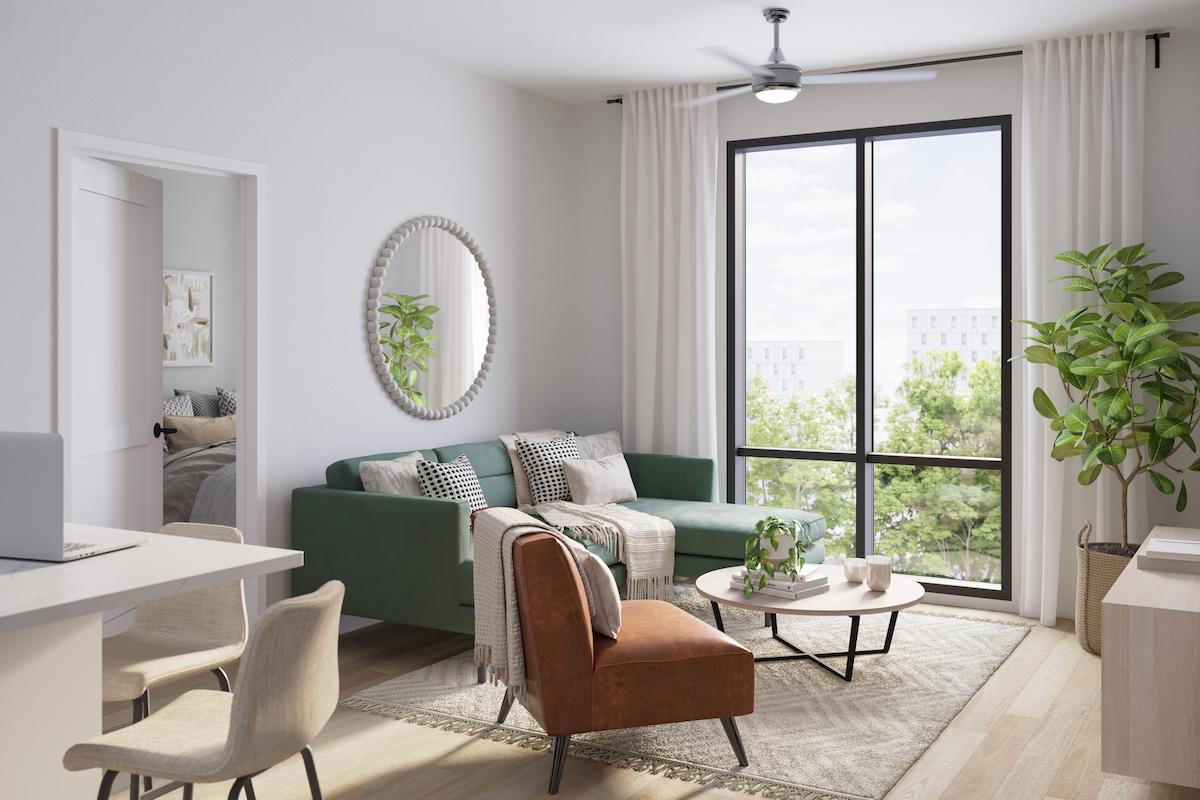
Can I sign a lease if I don’t have any roommates?
Yes! Rambler offers a roommate matching service which is perfect for incoming freshman, international students, and transfer students. If you are wanting to live in a certain floorplan, we are also able to use roommate matching to fill up your apartment.
If you are wanting to be placed with roommates, please contact our leasing office for more information.
What happens after I sign my lease?
Sit back and relax with the peace of mind that you know where you’re living next year!
Once your lease is completed, you will get email notifications with more information on topics such as construction updates, events, and move-in.
Read more: How to Convince My Parents to Let Me Live at Rambler
Rambler seems like the right fit for me. What should I do next?
Explore Floorplans
Discover the perfect floorplan for you (and your roommates) from our selection of 19 floorplans.
Not sure which one is the best for you? Check out our floorplan comparison articles!
Take a Tour
Schedule a tour at our leasing office.
Apply Today
Ready to sign a lease? Fill out an application online.
These aren’t just four walls. This is home.
We hope that this guide has helped simplify the process of finding a place to live in Athens as a student at the University of Georgia. By following this guide, you will be well on your way to finding the perfect place for you and your needs!
If you need any additional help during this process, contact the Rambler Leasing Team. We are happy to help answer any questions you might have regarding your housing search or living at Rambler.
DISCLAIMER: This report, last updated October 2023, utilizes various real estate and economic data sources. The information within this document is time sensitive and will be kept relevant to major shifts in the market. No warranties or guarantees are made as to the accuracy of the information contained herein.

